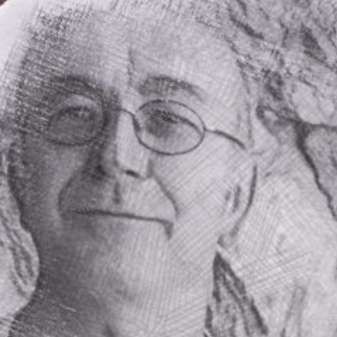It was the hottest ticket in town. An limited audience of 100 convened for The End of the World (for one night only). The venue which I had mistakenly perceived as a single building turned out to be more of a small village. Summerhall was, from 1916 to 2011, the home of the Royal (Dick) School of Veterinary Studies, known to locals as the Dick Vet. Evidence of this previous life obtained as we were promenaded through the compound for this theatre and music event. It put me in mind of the kind of place where Edinburgh’s cultural types might be rounded up in the event of a military coup.
Foregathered in the intimate bar, we were led in four groups (distinguished by variously coloured wristbands) across the courtyard to the foot of a grand staircase in the reception area. A sombre string quartet played from the half landing. There then appeared a lugubrious narrator in the shape of Andrew Dallmeyer, Fringe First and BAFTA (Scotland) winning playwright and actor.
Embarking on Oliver Emanuel’s inventive script, he explained that he’d received a call from an unknown man with a Spanish accent who revealed that, as a result of his doing something he shouldn’t have, the world was going to end today. We had all seen various social and professional media pieces on how the Mayan calendar simply runs out on this date. Although much of what followed would be very moving, there was sufficient irony in the script and delivery to let us know that this was going to be fun too.
At this point the coloured wristbands began to make sense. Four scenes were going to run concurrently in different areas of the complex. Groups were ushered by young actors who I took to be drama students. As we moved from one location to another, we passed these young actors in a variety of poses, murmuring ominous incantations. It didn’t become clear just how many were involved until all 26 assembled for the final scene. Also stationed around the compound were musicians. Those who had attended Red Note’s Hymn of Thanks (Transcendence) event two evenings previously would recognise not only the members of the string quartet, but snatches of Beethoven’s Heileger Dankgesang. This Beethovenian motif-planting strategy conferred a sense of homecoming when the third movement of Beethoven’s Op. 132 featured at the event’s conclusion.
Each of the stories featured one narrator and two actors – with the exception of the tale of Donald, whose situation was lent urgency by two young female narrators. Old and tired, he ends his life by overdose at the top of Arthur’s Seat, the volcanic protuberance in the centre of Edinburgh. When he lies down, one narrator stresses that silence is not the same as nothingness – a truth which most musicians would defend.
A common element in the other stories was communion of various sorts and how this seemed to be initiated by the world’s end. This certainly chimes with Bolivian president Evo Morales’ interpretation of this moment in history when we exchange an age of separateness and individuality for one of community with one another and the Earth.
As you’d expect, an event of this sort tends to bond an audience. This complicité was as its most evident when we unquestioningly occupied the cells (cages) to which we were led. Fittingly, one of my cell mates found this hilarious. Three or four to a cell, we heard the tale of a dancer in the High Street who had long sought to defy gravity being circled enviously by the apocalyptic eagle who longed more than anything to be human.
Finally, all were reunited for the story of Juan, whose obsession and meddling with Pi had caused our plight. The young actors each delivered a few lines from a balcony above, to the accompaniment of Aby Vulliamy’s musical saw. Then curtains opened to reveal an ensemble of string quartet, soprano, toy piano and musical saw. In addition to the Beethoven, they performed: love lost love by Red Note’s chief executive and co-artistic director John Harris, who also conducted; Hanna Tuulikki’s Sea Saw the Circle whose circular score appeared on overhead screen; Colin Broom’s Post-human, in which a flickering radio dial finally landed on a station where a voice reminded us that all evidence of our presence on Earth will eventually vanish. In Gareth Williams’ closing Blossom the quartet’s still chords reminded me of the harmonium accompaniments of surreal Glasgow poet Ivor Cutler – an impression not diluted when soprano Shuna Sendall reached for her ukulele.
By the end of this extraordinary evening there was a genuine sense of joy and community in the venue. An ingenious and spectacularly co-ordinated feat had been pulled off and the audience communicated their warmth with lasting applause.


